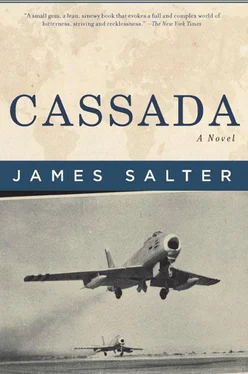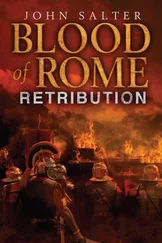“Couldn’t we stretch the regulations a little?”
“No.”
“Just to show these guys. Day, night, up, down, whatever, we do it better.”
For a moment Isbell saw them suddenly appearing beneath the heavy, low clouds like couriers and taxiing in with somebody, Grace maybe, maybe Dunning leaning out of the window of the Volksbus and calling up. Isbell couldn’t hear what they were saying. Chocks were being put under the wheels. He took off his helmet and cupped his ear.
“What?”
“We’d given up on you for today.”
Isbell looked up at the ominous clouds just above his head that represented the thing he was meant to avoid despite any pride: the act that was indefensible, that proved nothing.
He looked at Cassada, the blue of his eyes, a pure undaunted blue.
“You suppose they’re still out there?” Leeman asked.
Sparrow was pouring a beer. “What are you worried about?” he said.
“I just don’t want to be sitting around for nothing. I don’t want to have left Tripoli hours before them and get home a day later.”
“Yeah. Humiliating.”
“That’s the trouble with you.”
“What’s wrong?” Sparrow said. “I do what I’m told. You say Marignane—here we are. Captain Pine says log two hours every flight, I log two hours. What am I supposed to do?”
“Never mind.”
“I may not do everything on the dead run, but hey, the perfect wingman. I pad my flying time, I go to beer call, I know all the songs.”
Leeman interrupted him with a slight, dampening motion of his hand.
“Why don’t you have a beer?”
“Shut up a minute.”
“What is it?”
“You hear that?”
Sparrow looked at the floor. He heard nothing. A car went by outside. “What?”
“That’s them.”
Sparrow listened again.
“It’s somebody,” he said. “It might not be them. It could be French.”
“No.”
“How can you tell?”
“I know. I know Isbell.”
“Just by the sound of his engine? You’re all right.”
“That’s them,” Leeman repeated.
They listened. The sound rose a little, then faded.
“I’m going to call the field,” Leeman said, “but that was them. I know it.”
After a few minutes he came back, vindicated. He’d spoken to the forecaster who had finally come up with an alternate, Eindhoven. The weather there was at the edge of the low.
Ahead lay Valence, half in sunlight, half in shadow, grey against white with touches of gold. They were still climbing, passing twenty-five thousand. Off to the left was an autumn sun in the light of which Cassada’s contrail gleamed, a late sun, emptied of heat. Long, clear rays. A sun that infused the canopy like crystal. Isbell could see the minute scratches in the plexiglas and in the rosy brown of his visor, unexpectedly, a huge eye, the size of a plum, his own. Moist pupil, dark watery iris, lashes. It was staring at something, unwary, intent. At itself.
He looked down toward the earth again and watched the line of the first clouds that, very low, divided Valence in two. Slowly all of it disappeared beneath the nose of the plane. The clouds were a vast glacier extending in all directions as far as he could see. Behind, like a departed shore, the last sight of the earth fell away. Brown hills were vanishing, a thin, polished river. Still in a climb they flew toward Lyons.
The clouds deepened as they went, the tops mounting. At thirty-five thousand Isbell leveled off. The tops were about twenty—it was difficult to say because they weren’t solid though they looked it at first. There were large breaks in them. There were shaftways and passages. Milky rays of sunlight shot along them revealing caverns, abysses.
Nearing Lyons the needle of the radio compass began to waver. It fell off halfway, returned, then swung completely around. Isbell watched it, listening to the steady tone of the beacon and thinking not so much of the distance ahead but of how far they had come and how long a way it was back. The cockpit heat was not working well. His feet were cold and the top of the canopy had become white with little stars of frost, as exact as if they had been etched in the glass.
The sun fell lower. It was in the last quarter of its elevation, the light flat. The white of the clouds had faded like an old wall. Everything seemed silent and still as they headed towards Dijon. There was a strange, lost feeling, as though they were in an empty house, in rooms without furniture, looking through windows that had no glass. The world seemed abandoned. The last being had vanished from earth. There were ghostly cities below, desolate highways, meadows bathed in dead light. He had the map unfolded across his lap, looking ahead, listening to nothing. One lone sound reassured him, steady, unending, the sound of the engine, closer to him than breathing, more familiar than his heart.
As they swung Dijon, Isbell made a small x on the map, the point of his pencil going through. Beside it he wrote the time. A few minutes later he called Chaumont. He was already picking up their beacon.
There was no answer. After a pause, he called again. He was about to try a third time when he heard Cassada,
“They’re answering you, Lead.”
Cassada’s transmission was weak. Isbell barely heard it.
“I can’t read them,” he said.
“White Lead from White Two,” Cassada called.
“Go ahead.”
“Chaumont Tower is calling you.”
“Ask them for destination weather.”
“Say again?”
Isbell was pressing the mike button harder, as if he could force his wingman to hear.
“The latest… destination… weather,” he said very slowly. Chaumont was an American base, their weather information would be current.
“You want the latest weather?” There was something more that could not be made out.
“Roger.”
“Say again?”
“Roger. The latest weather. The latest weather,” Isbell said.
He could hear Cassada transmitting but not clearly. There was a long silence. He began to be uneasy. It was hard to wait. They were traveling seven or eight miles each minute. The sun had sunk lower and a different cast was coming over the sky. In the distance, purples were appearing, the last faint reds. He looked to the east. There, past Italy, were the pillars of night, the deep, welling blues following in the wake of the sun, crossing the invisible Alps, darkening tidelike the clouds of Salzburg, Munich.
“Did you get that?” he heard.
“Negative.”
“Did you get the weather, Lead?”
“Negative, negative,” Isbell said.
“I can’t read you. It’s five hundred overcast and two miles… .” There was something else, unintelligible.
“What do they have at Chaumont?”
“I can’t read you at all. You’re very weak and garbled.”
Isbell repeated his transmission four or five times. Finally he was understood. He waited. They were past Chaumont by then. The sun was just above the top deck of clouds. The quiet was unnerving. There was an immense, long silence. Time slowed. The minutes grew.
Isbell heard nothing more. His radio was dead, there was not even a side tone. He switched from one channel to another, trying to call or hear anybody. There was nothing. Five hundred and two, he was thinking, trying to consider it calmly. The sun was just touching the clouds, tangent to the highest layer, turning it dark as if an act were ending. They had been flying more than an hour. Five hundred and two.
He looked out at Cassada and began rocking his wings. He looked at the map. It was more than four hundred miles back to Marseilles. Cassada hadn’t moved. Isbell rocked his wings again. Cassada banked gently in towards him. He watched him curve in slowly, the white wake bending, and slide perfectly to Isbell’s wingtip.
Читать дальше












